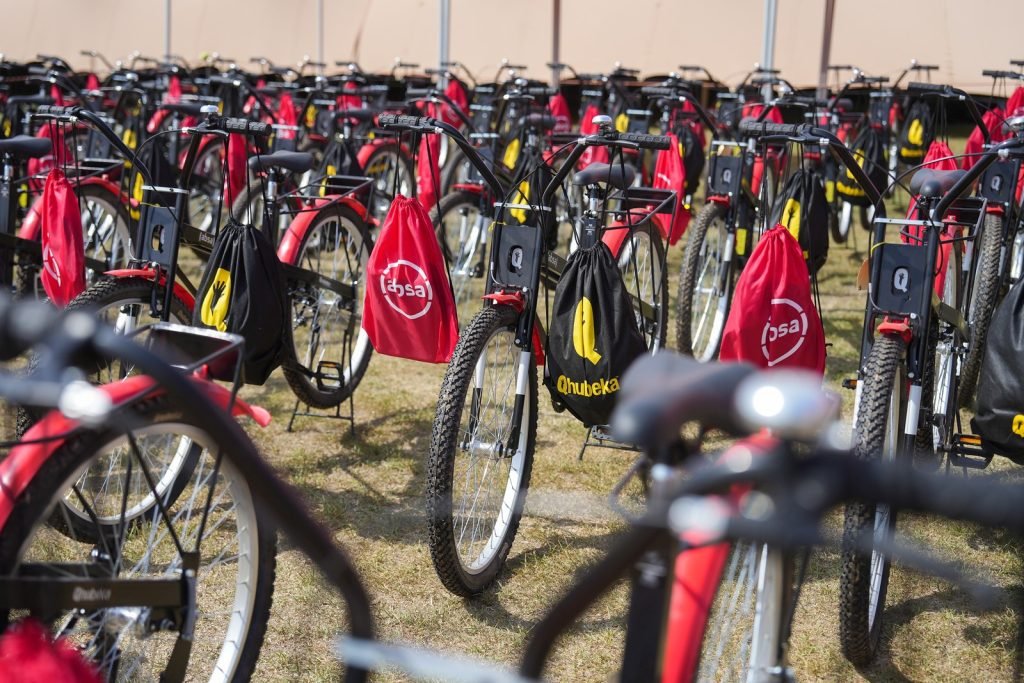L-R: Wandile Sihlobo, Chief Economist at the Agricultural Business Chamber of South Africa; Keneilwe Nailana-Mabona, Senior Manager for Agribusiness at Standard Bank; Anthony Viljoen, Director of Agronomy at PepsiCo SA; Tshego Selepe, Head of Agribusiness at Kgodiso Development Fund; Ayanda Mbonani-Vana, Chief Operating Officer at Khula! and Gauteng MEC: Agriculture and Rural Development, Vuyiswa Ramokgopa
Women are highly bankable, says Gauteng’s MEC for Agriculture and Rural Development, Vuyiswa Ramokgopa
Addressing the gender-diversity gap in South Africa’s agricultural sector is crucial for its future growth. This was the central message from Gauteng MEC for Agriculture and Rural Development, Vuyiswa Ramokgopa, during PepsiCo South Africa’s LinkedIn Live event titled “The Business of Being a Woman in Farming,” held last Thursday. The event, coinciding with Women’s Month in August, highlighted the essential role women play within the agriculture sector and explored strategies to overcome the challenges they face.
PepsiCo South Africa, recognising the pivotal role of women in agriculture, organised this event to ultimately drive meaningful change within industry. Anthony Viljoen, Director of Agronomy at PepsiCo South Africa, emphasised the global impact of women-led agriculture, noting that studies show a potential 20% to 30% increase in productivity if agriculture was predominantly led by women. “Our role is to empower local female farmers by enhancing their productivity and driving advancements in agronomy that benefit both their businesses and the broader agricultural community,” Viljoen stated.
MEC Ramokgopa expressed further optimism about the rising role women in agriculture are playing stating: “It’s inspiring to see women leading the sector, with women comprising a third of the agricultural labour force, and a significant share of smallholder production. Our challenge now lies in turning this substantial contribution in smallholder production into commercial success and to ensure that South Africa’s women are adequately compensated and valued across the supply chain.”
The Department currently runs several programmes in partnership with various stakeholders to aid productivity and resilience for women in farming. “We need more active collaboration with financial services, agribusinesses, and local government to further boost access for women in agriculture through training and capacity-building,” she added.
Tshego Selepe, Head of Agribusiness at Kgodiso Development Fund (KDF) working directly with farmers as part of her everyday role, unpacked key insights from industry and highlighted the significant contributions women are championing in agriculture, noting: “Women have shown remarkable resilience and capability in sustaining agricultural activities, ensuring food security, and driving economic growth, even in the face of numerous challenges. Their determination and strength are evident in their consistent contributions to agricultural productivity and the nation’s economic development.”
Ayanda Mbonani-Vana, Chief Operating Officer at Khula!, an agri-tech digital ecosystem, stated that innovative digital and technology solutions are bridging the market gap and creating opportunities for rural female farmers. This means that given the advantages of technology, industry is now able to offer women farmers with real-time market information, connecting them to buyers, and offering transportation solutions:
“Agriculture has been one of the key drivers in innovation and technology since the stone age. Take for example the grinding stone, which later evolved into the complex machinery we see today. The notion that farmers are struggling with innovation is far-fetched, when technology was, and will always remain logic-based solutions driven by the needs of the sector.”
Wandile Sihlobo, Chief Economist at the Agricultural Business Chamber of South Africa and moderator of the panel discussion, emphasised key aspects to appreciate about the agricultural sector. He observed that, the sector has grown remarkably, having more than doubled in value and volume since 1994, and now being the time to examine and reflect on its current state of gender disparity.
“We must recognise two key points about South Africa’s agriculture sector: First, it plays a vital role in our economy, representing approximately 3% of GDP at the primary level. When including both agriculture and agri-processing, this contribution rises to around 8% of the national GDP. Additionally, despite the challenges of unemployment, agriculture and agri-processing together account for about 8% of the country’s labour market.”
Keneilwe Nailana-Mabona, Senior Manager for Agribusiness at Standard Bank, expanded the discussion with a focus on prioritising financial access to South Africa’s women. “Women are a valuable investment,” Nailana-Mabona said. “From a financial services perspective, access to agricultural expertise and strategic management skills is essential for transforming agribusinesses into successful enterprises.”
The event sought to address the unique challenges faced by female farmers, some of which include barriers to resources, funding, and recognition.
The post PepsiCo SA leverages key agricultural event to empower women farmers appeared first on The Home Of Great South African News.
Women are highly bankable, says Gauteng’s MEC for Agriculture and Rural Development, Vuyiswa Ramokgopa. Addressing the gender-diversity gap in South Africa’s agricultural sector is crucial for its future growth
The post PepsiCo SA leverages key agricultural event to empower women farmers appeared first on The Home Of Great South African News. Read More


